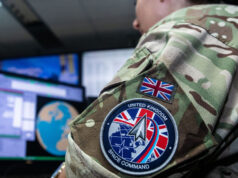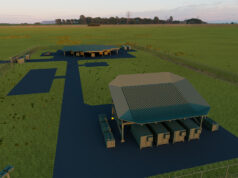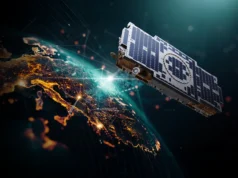International efforts to protect future space activity have been given a boost thanks to a new partnership between the UN and the UK government, say UK Space.
The agreement will help nations ensure that outer space remains safe and sustainable for future generations.
“The increasing complexity of space missions, the emergence of large constellations of satellites and the increased risks of collision all affect the long-term sustainability of space activities. And there are currently approximately 170 million objects in orbit – mainly debris – which could collide with satellites vital to services we use every day.
In 2019, the United Nations Committee on the Peaceful Uses of Outer Space (COPUOS), of which the UN Office for Outer Space Affairs (UNOOSA) is Secretariat, adopted the Guidelines for the Long-Term Sustainability of Outer Space Activities (LTS guidelines), which provide a framework to ensure the safe and sustainable use of space. The Guidelines were subsequently welcomed by the United Nations General Assembly.”
Following a recent announcement, UK funding of £85,000 will support international efforts to promote space sustainability by identifying examples of the sustainable use of outer space through a series of events and outreach efforts. This project will also inform future UNOOSA capacity-building efforts to promote the future sustainability of outer space, and it will encourage all actors to implement the LTS guidelines to the fullest extent possible.
Science Minister Amanda Solloway said:
“As the Earth’s orbit becomes congested with potentially hazardous debris, it’s critical that we work with our international partners to secure the continued safety and sustainability of space. I am therefore delighted the UK is partnering with the UN to implement and promote these vital standards to all emerging and established space-faring nations, helping to ensure that outer space remains open for our next generation of astronauts.”
This partnership with the UK Space Agency is the first time the UK has funded a project with UNOOSA. It is hoped that this will enable the UN to raise global awareness on this important issue and foster the global governance of outer space based on international law.
UNOOSA Director Simonetta Di Pippo said:
“Global investment, and dependency, on space activities are increasing rapidly. It is essential the international community comes together to make the long-term sustainability of space activities a reality. The LTS Guidelines are a landmark expression of global consensus and effective multilateralism on this crucial subject. UNOOSA is working to put sustainability at the heart of global space operations. This project, generously funded by our UK partners, will help us ‘connect the dots’; converting the successes of multilateral policy-making into practice, and help deliver the predictability the global space economy needs to ensure its sustained growth in the years to come.”











Well done to the UK Government. It may seem irrelevant, but it is another example of the UK taking a lead in the world community. Well done!
So what you are saying is that the UK just spent £85,000 on an irrelevancy. As if the US, China, Russia, or Elon Musk or Jeff Bezos gives a fig as to what COPOUS or UNOOSA (talk about acronyms) says or does.
Seriously PK you need to find a American defence Forum ,you seem to be
to sensitive to people from the UK expressing positive opinions of their country.
No the commentators on this blog need to start living in the real world. The idea that spending £85,000 at a UN talking shop is going to be useful or effective rather than a pretentious attempt by some bureaucrats to pretend they are doing something effective is a perfect reflection of the air of unreality when it comes to Britain’s place in the world and just how much influence it has. If asking someone to face reality is expressing a negative opinion, then so be it.
Yeah we should all take a long hard look at ourselves lately shouldn’t we. US soft power has escaped from the clutches of the US diplomatic services quicker than a fart from silk shorts over the last 4 years
No offence PK but you are looking at the UK from a super power perspective and there are only 2 superpowers in the the world, the UK has world influence in spades for the position it is in and us being once a superpower is irrelevant to most people in the UK opinions of where we stand in the world, so stop comparing the UK to superpowers ,it is you thats continues to sit on your high horse.
Well said.
I am not saying it is irrelevant. I agree that the acronyms are more than just a little clunky!! The UK should be taking a leading role in the recognised international governing body. I agree that the COPOUS and UNOOSA may seem to bear a resemblance to the irrelevance of the League of Nations in the lead up to the horrors of the Second World War and the Holocaust.
I think that there needs to be a governing body to set standards in the littering of the Low Earth Orbit (LEO) with left over detritus of the space race.
Like climate change, the new space race lacks any controls, unless they are imposed by the host governments.
It is very interesting to see the work being done by the new players on the filed. SpaceX is leading the pack, not only in the pace of launches but their work to reduce waste. So much of the current Falcon programme are reusable and the whole of the developing ‘Starship’ which is 100% reusable.
Also the fuel used for Starship produces next to no emissions.
I have a lot of fear that space will be further weaponised. We need to get others to sign up to keeping space free of the bigotry we see here on Earth.
Sadly, I see no chance of China, Russia, North Korea, Iran etc. joining. Hence, why I sadly think it may be an irrelevance. But, as a country we need to stand up and do what is right. Sometimes, it is difficult.And, it may be difficult to rationalise, sadly.
SpaceX is putting satellites up by the hundreds. They may be reusing their launchers but that’s nothing compared to what they are launching.
Space is already weaponized. Even India has an ASAT weapon The UK is just way behind the curve when it comes to space and hoping the United Nations will do something about it is living in an unreal world. T
Why wouldn’t they?
All those parties you mentioned have a stake in it; as th article says, 170 million objects in space, most of which is junk whipping around at 20,000+ miles an hour. It’s in nobody’s interests for that junk to trash their expensive satellites.
Not to mention that every nut or bolt that is left in orbit is another one that has to be replaced. Governments and businesses will be interested if it means longer term savings down the road – again, also in not losing satellites to said space junk.